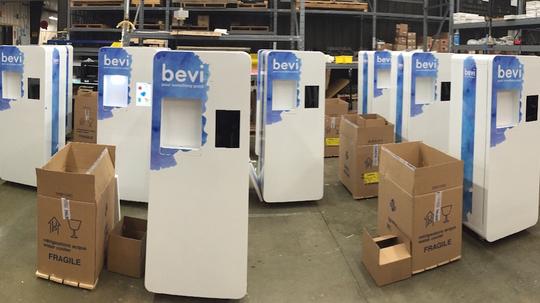
Bevi, a Boston-based maker of smart water coolers, nowadays is a business with solid numbers: over 1,500 machines in the field, almost 70 employees, three offices (in Boston's Charlestown, New York and San Francisco) and $16.5 million in a Series B round of financing led by Trinity Ventures, which was an early investor in Starbucks.
But things have not always been easy for the Techstars Boston alum, especially between 2013 and 2015. At that time, Bevi was still figuring out its market fit and struggling to satisfy its first customers. In at least two occasions, the Cambridge-born company — which is on a mission to substitute disposable bottles with custom beverage machines — was in hot water.
Frank Lee has witnessed the company's ups and downs since the very beginning, having co-founded Bevi with Eliza Becton and Sean Grundy in 2013. Currently head of marketing at Bevi, he said he played a "weird role" in the history of the company, which included going to the site of the very first machine to reset its reader at least twice a day for a couple of months.
"I guess you can call me 'Jack of all trades,'" Lee said. "My role has been anywhere from engineering, manufacturing, operations."
Here are the two stories of failure that Lee shared, and the actionable takeaways he said he learned.
Failure 1: The Machine That Didn't Work
The idea the brought the Bevi founders together was eliminating the plastic waste that is the consequence of customers buying bottled beverages. Today, Bevi solves this problem by selling smart machines that deliver a variety of beverages directly into the users' reusable mug or bottle. Bevi's customers are mainly offices, which install the machines as a perk for their employees. As a result, final users don't pay for their beverages.
Now, identifying this scenario as the company's ideal business model took time. The initial product prototype was a more traditional vending machine, where customers swipe their credit cards to refill a reusable bottle. The first machine of this type was installed at the front desk of rock-climbing gym Brooklyn Boulders in Somerville.
"We were literally making $10 a week and, honestly, half of that was just us swiping credit cards."
And it didn't really work for two reasons, according to Lee. First, no passer-by wanted to spend money on a vending machine from a then-unknown brand. "We were literally making $10 a week and, honestly, half of that was just us swiping credit cards," Lee said.
On top of that, the credit card reader was constantly going down, to the point that Lee - in the middle of 2014's Boston winter - had to go reset the machine twice a day for seven days a week. The whole thing went on for at least two months.
"Oh, man," Lee said. "It got very depressing very quickly."
Lee said that it was a really hard time for the company, as they couldn't figure out how to scale quickly and how to make the machine reliable. Luckily, at the same time, co-founder Grundy started talking with offices, Lee said, and learned that offices are always looking for new perks to please employees.
Grundy's discovery allowed Bevi to kill its two problems with one stone. On one hand, by pitching their product to office managers, they only had to convince one person to buy the machine. And, as office perks, machines didn't need to carry the unreliable credit card reader that created so many issues. From that moment on, the company was able to scale and raise a seed round, Lee said.
Takeaway: "Sometimes, you really don't know where you're going to end up... Because of [Sean Grundy's] broader approach, we were able to be receptive [to] looking at other verticals. During these pivot moments, you really have to count on your fellow team members," Lee said.
Failure 2: The 10 Machines That Didn't Work
Unfortunately for Bevi, the troubles with its machines didn't end the moment the market fit became clearer. Once the company had understood what customers wanted, it all came to how it would deliver the product - a moment that presented its unique set of challenges.
In 2015, Bevi had already pre-sold ten machines to its first customers, which included MIT and Akamai. But the Vermont-based contract manufacturer had still to deliver these first ten machines, so things went hectic really quickly. On top of that, the company was still working on product development while manufacturing. "We were really in a time crunch," Lee admitted.
"It was not a good first impression."
Long story short, all 10 customers received machines that ended up not working. "On a Thursday, I remember Sean starting getting angry emails from customers," Lee said. "That was the first time we were trying to scale, trying to have repeatable customers. It was not a good first impression."
It turned out that the problem lay in the safety device that automatically shuts the machine off in case of leaks. Ten times out of ten, the so-called "water blocks" had gotten into action with no leak being detected, preventing users from getting any water from the machine.
Lee said that Bevi had tested "every single part" of the machines. "But that's one part that we didn't look at carefully," he admitted.
In the end, it took Bevi a team of six to eight people (and a batch of cookies) to fix the machines and smooth things up with the customers.
"The thing that won't fail would probably fail."
Takeaways: "One, never do product development during manufacturing," Lee said. "Two, the thing that won't fail would probably fail." So, it's better to test every single component, especially ones that you thought couldn’t fail.








